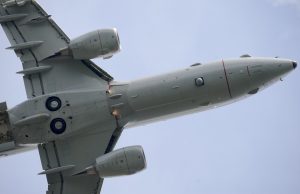Today, Reuters reported that Indonesia has rejected a proposal by the United States to allow its P-8 Poseidon maritime surveillance aircraft to land and refuel in the archipelagic nation.
The report, based on information from four senior Indonesian officials, claims that U.S. officials made multiple “high-level” approaches in July and August to Indonesia’s defense and foreign ministers before President Joko “Jokowi” Widodo – unsurprisingly – torpedoed the American request.
The U.S. Air Force’s Boeing P-8 Poseidon plays a central role in monitoring on China’s military activity in Southeast Asia, particularly in the disputed South China Sea. P-8s have been based in Singapore since 2015, and have also been deployed from airfields in the Philippines and Japan.
The revelation comes as Indonesian Defense Minister Prabowo Subianto winds up a five-day visit to the U.S. at the invitation of Defense Secretary Mark Esper, as the Trump administration seeks to push Southeast Asian countries to counter China’s rising influence in the region.
As the Reuters article pointed out, that the U.S. would make such a request to Indonesia is puzzling, given the country’s long-standing neutralist stance and abiding touchiness about superpower alignments. Indeed, the request seems to evince a tendency in American foreign policymaking toward the region: an assumption that Southeast Asian nations share Washington’s view of China as an unequivocally hostile and predatory power, and will therefore sign up to a containment policy premised on these perceptions.
As I have written at length elsewhere, while Indonesia and other Southeast Asian nations are deeply apprehensive and of China’s growing military and economic power, they do not have the luxury of viewing China in such binary terms.
It is true that Indonesia has seen frictions with Chinese coast guard vessels in parts of the South China Sea where Beijing’s expansive “nine-dash line” claim overlaps with Indonesia’s Exclusive Economic Zone. It is also true that Indonesia sees the U.S. as an important stabilizing force at the fulcrum of the Indian and Pacific oceans, as well as a source of military hardware.
But the country also has growing economic and investment links with China that militate against it taking a strong anti-China stance. Since taking office in 2014, Jokowi has leaned heavily on China for infrastructure funding that can help realize his ambitious domestic economic agenda. The year before his election, China replaced Japan as Indonesia’s top trading partner, and currently accounts for 24 percent of the country’s total trade.
To varying degrees, much the same is true for the other nations of Southeast Asia. Writing in these pages last week, Indonesia’s former ambassador to the U.S., Dino Patti Djalal, argued that Washington’s sharp anti-China turn had fallen on deaf ears in the region. “Southeast Asian countries, who decades ago ignored poverty-stricken China, have now accepted China as an important part of their economic future,” he wrote. “To expect Southeast Asian governments to commit to a blanket opposition to China under these circumstances is totally unrealistic.”
In general, Indonesia views the escalating U.S.-China conflict as contrary to its national interests, and wishes to avoid being drawn into either camp. In an interview with Reuters, Greg Poling of the Washington D.C.-based Center for Strategic and International Studies, said the spy plane request was an indication of “how little folks in the U.S. government understand Indonesia. There’s a clear ceiling to what you can do, and when it comes to Indonesia that ceiling is putting boots on the ground.”
Since declaring its independence from Dutch rule in 1945, Indonesia has tried to maintain a foreign policy that is “independent and active” (bebas dan aktif), one that Mohammad Hatta, the country’s first vice president, characterized as “rowing between two reefs.” While the dictator Suharto brought the country into the anticommunist camp in the years after his putsch in 1966, Indonesia has never allowed foreign militaries to operate on its soil.
That high-level policymakers in Washington were unaware of Indonesia’s allergy to superpower alignments, or knew but made the request anyway, bodes ill for the crafting of an effective American strategy toward Southeast Asia.

































